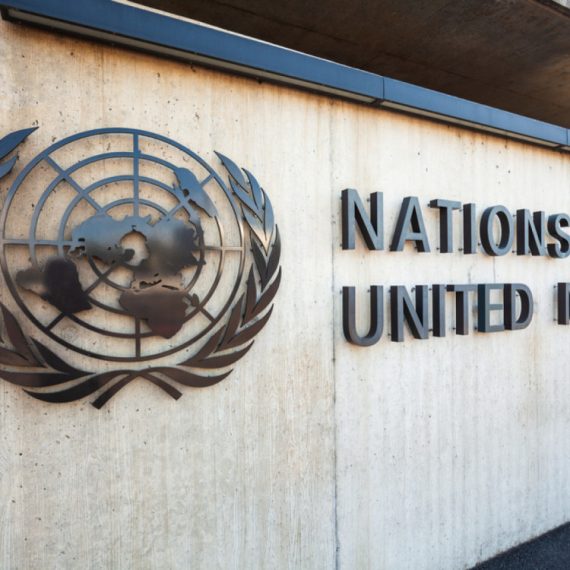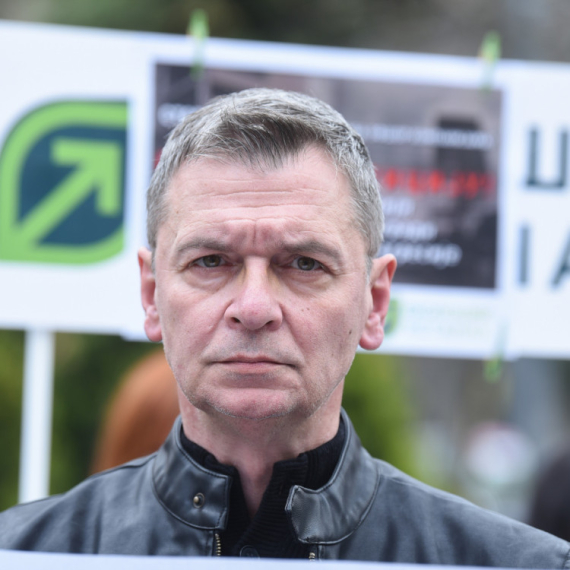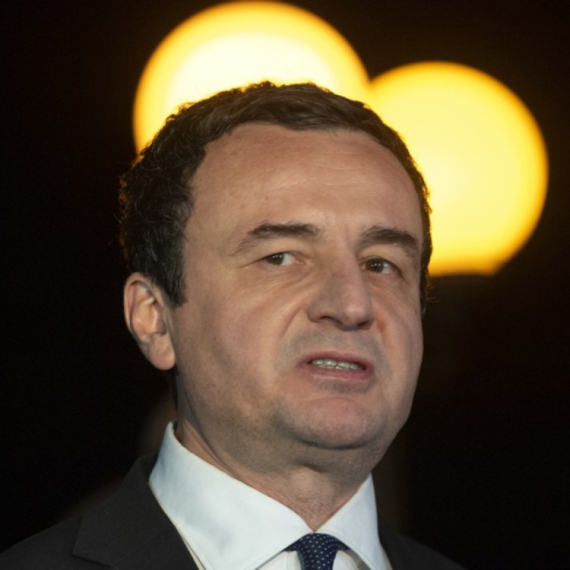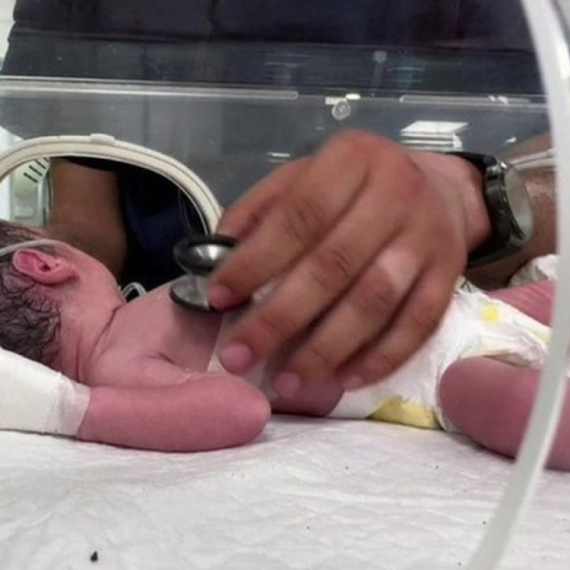"Serbia could open talks with EU in 2013"
Serbia has a realistic chance of opening accession talks with the EU this year, European diplomats and analysts said on Thursday.
Thursday, 07.02.2013.
14:01

BRUSSELS Serbia has a realistic chance of opening accession talks with the EU this year, European diplomats and analysts said on Thursday. They noted that "the administration of President Tomislav Nikolic" has considerably boosted Serbia's credibility in Brussels. "Serbia could open talks with EU in 2013" Progress in the dialogue and normalization of relations with Pristina are the key condition the European Council adopted last year for opening talks with Serbia, and the results are already clearly visible, a Western diplomat who asked to remain anonymous told Tanjug, pointing especially to the implementation of the agreement on integrated management of crossings in northern Kosovo, exchange of liaison officers, and finally, Wednesday's meeting of President Tomislav Nikolic and Kosovo's President Atifete Jahjaga. Support for EU enlargement to the Western Balkans, Serbia included, could previously be heard from the European institutions in Brussels, but new obstacles kept popping up in Serbia's path. This year there is a good chance things will come around and Serbia will get a date around the middle of the year, and open the first chapters by the end of 2013, which would place it side by side with Montenegro as a leader in EU integration, said the people Tanjug spoke to. Rosa Balfour, director of the European Policy Centre - an influential brain trust which has been dealing with issues of the Western Balkans intensively in recent years, believes Serbia will get the date in June. She told Tanjug that despite the doubt many expressed following last year's change of government in Serbia, the ruling coalition formed around the Serb Progressive Party (SNS) has considerably improved Serbia's credibility in Brussels. Brussels is pretty sure now that the political dialogue between Belgrade and Pristina can be over by April, said Balfour, cautioning that it remains to be seen whether everything that is agreed will be successfully implemented on the ground. Asked whether some EU member countries might start coming up with new conditions ahead of the decision on the date, the aforementioned unnamed diplomat said he is sure it will not happen this time. The Council's conclusions from December are very clear and leave very little room for flexible interpretations and new terms, he said. No one doubts any more that the Serbian government is determined to fulfill its promises and that their efforts deserve to be acknowledged, he said. He added that Catherine Ashton has invested a huge amount of time, energy, and even political capital to make sure the Belgrade-Pristina dialogue is successful, so its failure would represent her personal failure as well. Asked to comment on the prognosis of some Pristina officials that the political dialogue will finish with the signing of an agreement modeled after the one signed by the two Germanies during the Cold War, Balfour said this is not a foregone conclusion. Toby Vogel, an editor at European Voice - an English-language publication based in Brussels, believes that no serious obstacles remain on Serbia's path to the EU. The issue with the International Criminal Tribunal for the former Yugoslavia, which was a burden for years, has been resolved, and significant progress has been made regarding Kosovo, Vogel told Tanjug. He noted, however, that there is growing uncertainty in diplomatic circles over the stability of the ruling coalition in Serbia. In addition, there has been some dissatisfaction with the level of corruption and organized crime, even though the issue is overshadowed by Kosovo right now. Finally, countries like Germany and Sweden are frustrated over the problem of fake asylum seekers, which they believe the Serbian government is not doing enough to resolve, he said. Still, Vogel does not think any of the three problems could seriously jeopardize the decision on the date. There is a sincere will to help Serbia move forward, but the rule of law and the asylum seeker issue will be brought up much more often once accession talks get underway, he said. Tanjug
"Serbia could open talks with EU in 2013"
Progress in the dialogue and normalization of relations with Priština are the key condition the European Council adopted last year for opening talks with Serbia, and the results are already clearly visible, a Western diplomat who asked to remain anonymous told Tanjug, pointing especially to the implementation of the agreement on integrated management of crossings in northern Kosovo, exchange of liaison officers, and finally, Wednesday's meeting of President Tomislav Nikolić and Kosovo's President Atifete Jahjaga.Support for EU enlargement to the Western Balkans, Serbia included, could previously be heard from the European institutions in Brussels, but new obstacles kept popping up in Serbia's path.
This year there is a good chance things will come around and Serbia will get a date around the middle of the year, and open the first chapters by the end of 2013, which would place it side by side with Montenegro as a leader in EU integration, said the people Tanjug spoke to.
Rosa Balfour, director of the European Policy Centre - an influential brain trust which has been dealing with issues of the Western Balkans intensively in recent years, believes Serbia will get the date in June.
She told Tanjug that despite the doubt many expressed following last year's change of government in Serbia, the ruling coalition formed around the Serb Progressive Party (SNS) has considerably improved Serbia's credibility in Brussels.
Brussels is pretty sure now that the political dialogue between Belgrade and Priština can be over by April, said Balfour, cautioning that it remains to be seen whether everything that is agreed will be successfully implemented on the ground.
Asked whether some EU member countries might start coming up with new conditions ahead of the decision on the date, the aforementioned unnamed diplomat said he is sure it will not happen this time.
The Council's conclusions from December are very clear and leave very little room for flexible interpretations and new terms, he said.
No one doubts any more that the Serbian government is determined to fulfill its promises and that their efforts deserve to be acknowledged, he said.
He added that Catherine Ashton has invested a huge amount of time, energy, and even political capital to make sure the Belgrade-Priština dialogue is successful, so its failure would represent her personal failure as well.
Asked to comment on the prognosis of some Priština officials that the political dialogue will finish with the signing of an agreement modeled after the one signed by the two Germanies during the Cold War, Balfour said this is not a foregone conclusion.
Toby Vogel, an editor at European Voice - an English-language publication based in Brussels, believes that no serious obstacles remain on Serbia's path to the EU.
The issue with the International Criminal Tribunal for the former Yugoslavia, which was a burden for years, has been resolved, and significant progress has been made regarding Kosovo, Vogel told Tanjug.
He noted, however, that there is growing uncertainty in diplomatic circles over the stability of the ruling coalition in Serbia.
In addition, there has been some dissatisfaction with the level of corruption and organized crime, even though the issue is overshadowed by Kosovo right now.
Finally, countries like Germany and Sweden are frustrated over the problem of fake asylum seekers, which they believe the Serbian government is not doing enough to resolve, he said.
Still, Vogel does not think any of the three problems could seriously jeopardize the decision on the date.
There is a sincere will to help Serbia move forward, but the rule of law and the asylum seeker issue will be brought up much more often once accession talks get underway, he said.


























































Komentari 1
Pogledaj komentare